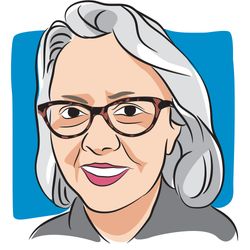- About Us
- Advertise / Support
- Editorial Board
- Contact Us
- CancerNetwork.com
- TargetedOnc.com
- OncLive.com
- OncNursingNews.com
- Terms & Conditions
- Privacy
- Do Not Sell My Information
© 2025 MJH Life Sciences™ and CURE - Oncology & Cancer News for Patients & Caregivers. All rights reserved.
What a Cancer Thriver Wishes They’d Known at Diagnosis
Valarie Traynham is a cancer thriver and serves as a patient advocate following her diagnoses of multiple myeloma and breast cancer.
A cancer thriver reflects on the emotional toll, survivorship, advocacy and support networks they wish they’d known at diagnosis.
Valarie Traynham reflects on how a cancer diagnosis can change everything — and what she wishes someone had told her at the start of her journey with multiple myeloma and breast cancer.
“You’re not alone,” Traynham says. But early on, she didn’t know that. After hearing the words “you have cancer,” she says she spiraled into a dark place and feared she wouldn’t live past 50. A grim prognosis at age 42 left her feeling hopeless — until she met a 26-year survivor and realized she could be an outlier. “‘Incurable’ doesn’t necessarily mean a death sentence,” she says.
Now a patient advocate, Traynham wants others to know what she didn’t: that treatment is emotional and physical toll can last long after chemo ends, that side effects can be life-altering, and that learning to advocate for yourself takes time and effort. Relationships may shift too; some friends drifted away, unsure how to respond, but new, deeper bonds formed in survivor communities helped carry her through.
Valarie Traynham identifies as a cancer thriver and serves as a patient advocate following her diagnoses of multiple myeloma and breast cancer.
Transcript:
What do you wish someone had told you when you were first diagnosed?
You're not alone. You know, a lot of times when you hear those words, “You have cancer,” you just go into this dark place and feel like nobody else gets it, nobody else understands. But just know that others have been on this road. They’ve walked this road. They are still standing — and you can do the same. One thing I always thought about as I was on this journey: when I looked at the prognosis early on, I was told 3 to 5 years. Then I met a 26-year survivor, and my mentality shifted.
I became that outlier. Whenever I looked at charts and graphs showing survival for myeloma or breast cancer, I told myself I was going to be that outlier. I wasn’t going to fall within those lines. I also wish someone had told me that incurable doesn’t necessarily mean a death sentence. When you hear those words: “You have multiple myeloma, an incurable cancer,” for me, it automatically went to, “Oh my God, I’m going to die.”
I was diagnosed so young. I thought about not living to see 50. I was 42 at diagnosis, and a three- to five-year prognosis meant maybe I wouldn’t live to see 50. I wish someone had told me it doesn’t have to be a death sentence.
I also wish someone had told me that when treatment stops, you could still be left with long-term, life-altering side effects. Those are things people don’t talk about. It’s all about getting you into treatment and taking care of you. I wish someone had told me that even after treatments stop, the emotional and mental processing still continues. It doesn’t end just because you’re not going in for chemo every week or however often. That emotional toll can still weigh on you.
I think I also wish someone had told me I was going to need to learn how to advocate for myself and what that really entailed. For me, it was a learning-as-I-went process. But I think had I known that upfront, I would have been in a better position.
And lastly, I wish someone had told me how cancer can change the dynamics of your relationships. I had friends who drifted away. They didn’t know what to say or were just uncomfortable for whatever reason. Others had never known anyone with cancer, so they didn’t know how to respond or offer the support I needed. Even family relationships shifted.
But I can say, even though I wish someone had prepared me for those changes — both the difficult and the positive — I found I made deeper connections in survivor communities and built new support networks. That has become a form of healing for me. I wish I had known that upfront. I wouldn’t have been so worried, just knowing there was a network out there that is so supportive.
For more news on cancer updates, research and education, don’t forget to subscribe to CURE®’s newsletters here.
Related Content:



